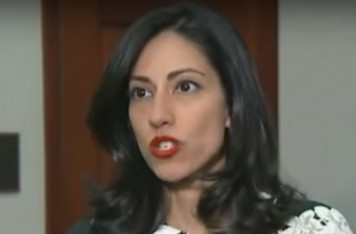 The deposition testimony of Huma Abedin, a top aide to Hillary Clinton, was released on Wednesday by the conservative watchdog group Judicial Watch. Abedin testified earlier this week for nearly six-hours as part of Freedom of Information Act (FOIA) lawsuit that seeks to determine whether Clinton and her aides acted in good faith in responding to open records requests. Like several of the other depositions thus far, Abedin could not seem to recall the specifics surrounding many of the questions she was asked and her attorneys also instructed her not to answer several questions. Here are five key takeaways from Abedin’s deposition testimony.
The deposition testimony of Huma Abedin, a top aide to Hillary Clinton, was released on Wednesday by the conservative watchdog group Judicial Watch. Abedin testified earlier this week for nearly six-hours as part of Freedom of Information Act (FOIA) lawsuit that seeks to determine whether Clinton and her aides acted in good faith in responding to open records requests. Like several of the other depositions thus far, Abedin could not seem to recall the specifics surrounding many of the questions she was asked and her attorneys also instructed her not to answer several questions. Here are five key takeaways from Abedin’s deposition testimony.
Huma on why the clintonemail.com system was set up:
Q: Why was the e-mails with the Clinton @clintonemail.com created?
A: Well, as I — as I mentioned earlier, we — I was losing both my e-mail addresses at the end of the presidential campaign and the Senate. So both my, you know, Clinton e-mail addresses were going. I needed a new e-mail.
I remember just reaching out and saying, what should I do. I’m no longer going to have HillaryClinton.com, and [an IT advisor] suggested @clintonemail.com being an option.
Nobody in the State Department ever discussed FOIA rules with her:
Q: Did you ever discuss any FOIA requests with anybody in the Secretary’s office during your tenure there?
A: I don’t have any memory of — of doing so.
Q: Okay. How about FOIA in general; do you recall any discussions that you may have had either with Cheryl Mills, Secretary Clinton, or anybody else in the Secretary’s office, about FOIA?
A: It wasn’t anything that I remember having discussions about.
Huma does not remember specific details of any discussions with State Department officials about the use of clintonemail.com email accounts:
Q: Did you consult with anyone from Clarence Finney’s office about the use of the clintonemail.com for State-related matters? And when I said “you,” either for — on your behalf or on behalf of the Secretary.
A: I don’t recall any conversations.
Q: All right. Did you or the Secretary or anyone on behalf of the Secretary consult with anybody in Patrick Kennedy‘s office about your use of the clintonemail.com accounts for State Department business?
A: Not that I remember.
Q: Okay. How about with anyone in the IRM office or the Executive Secretariat; did you or the Secretary or anyone on behalf of the Secretary consult with them about your use of the clintonemail.com accounts for State Department business?
A: Not that I remember.
Q: Did you consult with anybody at the State Department or did the — Secretary Clinton consult with anybody at the State Department or anyone on her behalf about the use of the clintonemail.com accounts for State Department business?
A: I don’t remember any conversations like that.
Huma’s attorney instructed her not to answer certain questions, including inquires into her unique employment arrangement while at the State Department:
Q: And did your position change at all while you were at the State Department?
A: Yes, it did.
Q: Okay. When did it change, and how did it — what did it change to?
A: It changed, if my memory serves me correctly, in the last six months it was about June of 2012, and I transitioned to being a senior advisor to the Office of the Secretary.
Q: Okay. And why did the change take place?
[Attorney]: Objection. Instruct the witness not to answer.
Clinton’s use of the private email account caused her to miss messages, including one about a phone call that was scheduled to take place with a foreign minister:
Q: When you wrote “releasing your e-mail address to the department,” can you explain what you meant by that?
A: So let me just give you some context of how I would have experienced a situation like this.
Her initial e-mail was about a phone call with a foreign — a foreign … minister, which she missed and missed the call because she never got the — I never got her e-mail suggests — giving us the signoff to do it. So she wasn’t able to do her job, do what she needed to do.
My response would have been, Here are some suggestions. I cannot tell you if I called somebody else. I don’t remember calling anybody else. Or if I on my own said, Here are some solutions so that your e-mails get through to us so that we can place call — calls to foreign officials.
And, you know, she clearly missed the window in this exchange.
Have a tip we should know? [email protected]